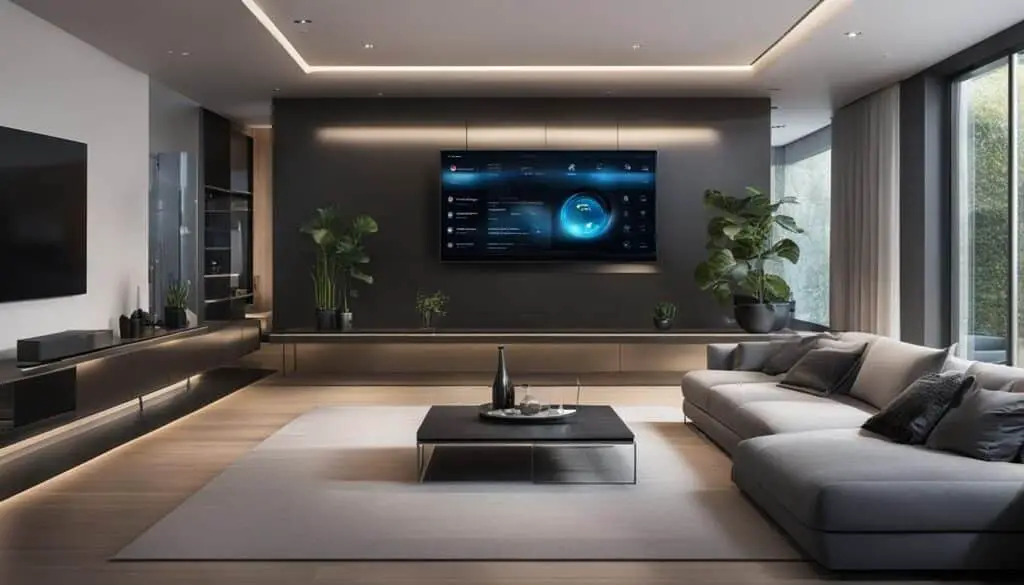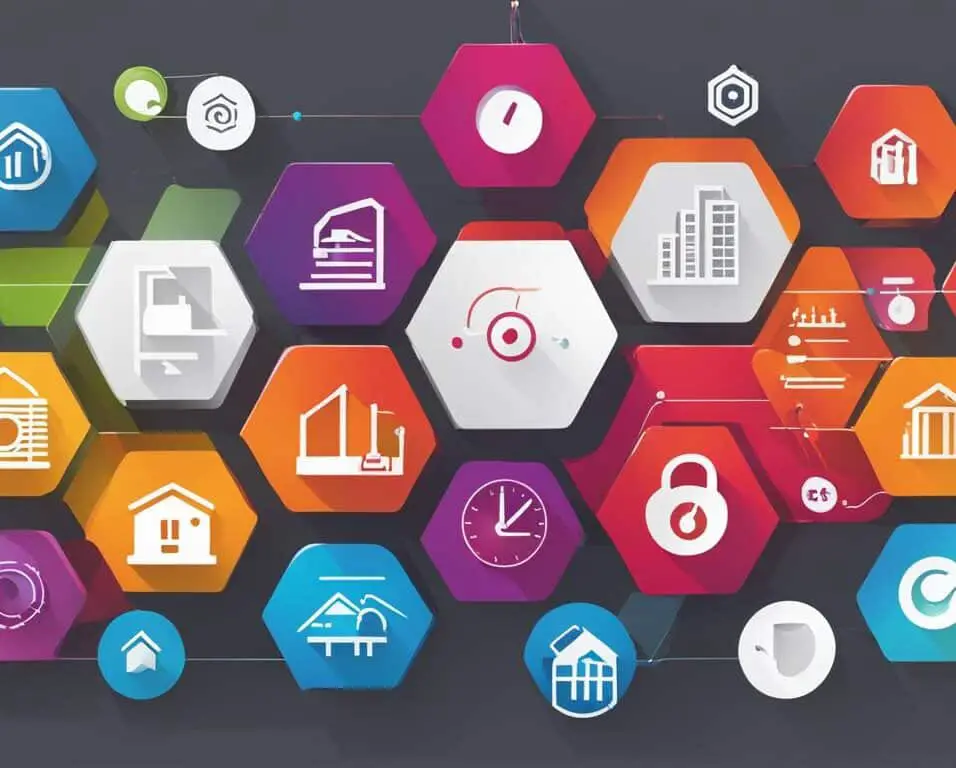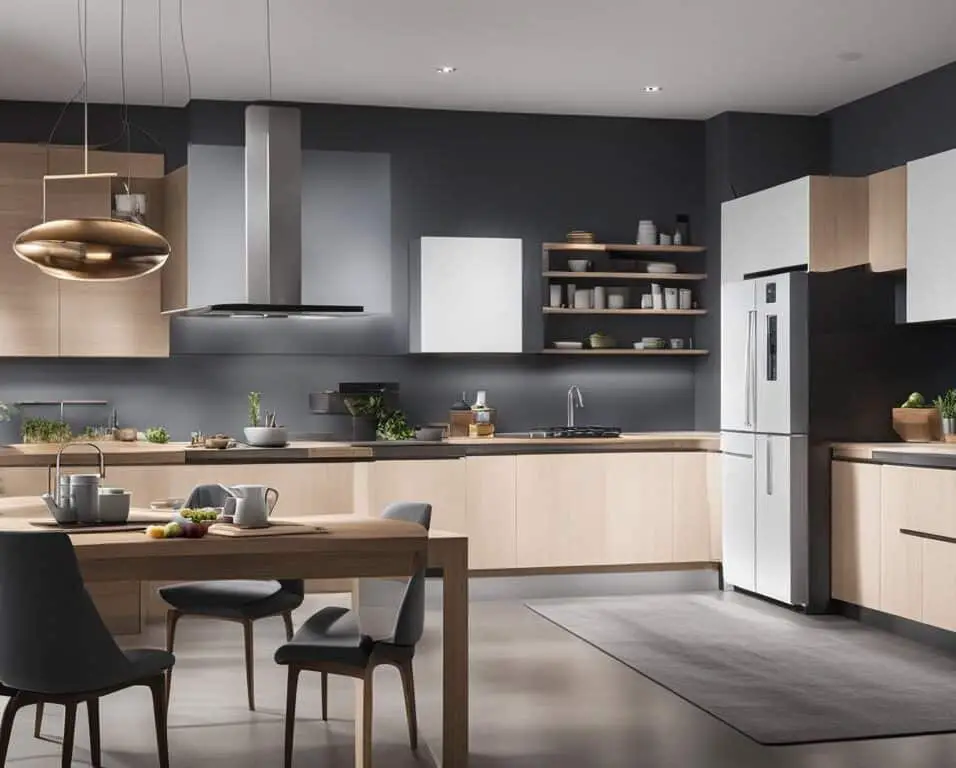AI Enhancing the Home Automation Experience
The advancement of AI and automation technologies has revolutionized the way we live and interact with our homes. AI-powered virtual assistants, like Amazon’s Alexa and Google Assistant, have become integral parts of many households, allowing homeowners to control and manage their connected devices through voice commands. These AI assistants offer hands-free control, personalized automation routines, and enhanced accessibility for individuals with disabilities. AI has also transformed home security systems, providing advanced threat detection, automated responses, and remote surveillance. Additionally, AI-enabled smart devices optimize energy consumption, reduce costs, and integrate renewable energy sources. The future of home living holds possibilities for increased personalization, health and wellness integration, and smart appliances.
Key Takeaways:
- AI-powered virtual assistants provide hands-free control and personalized automation routines in smart homes.
- AI enhances home security systems by offering advanced threat detection and automated responses.
- AI-enabled smart devices optimize energy consumption and integrate renewable energy sources.
- The future of home living includes increased personalization, health and wellness integration, and smart appliances.
The Rise of AI-Powered Smart Home Automation
The global smart home market is projected to reach $135 billion by 2026, fueled by the proliferation of AI-powered smart home devices. These devices enhance convenience, energy efficiency, security, and personalization in smart homes.
AI algorithms play a crucial role in smart home automation by learning from user behavior, preferences, and patterns. This allows them to create tailored automation routines and personalized experiences that cater to the unique needs of each homeowner.
The integration of AI into voice-activated assistants, such as Amazon Alexa and Google Assistant, has simplified interaction with smart home devices. Users can control their connected devices and manage their smart home ecosystem using simple voice commands, making the overall experience more intuitive and user-friendly.
The growth of AI in smart homes is further driven by the increasing number of connected devices and the Internet of Things (IoT). As more devices become interconnected, AI-powered automation becomes essential for managing and optimizing the overall smart home experience.
With AI-powered smart home automation, homeowners can enjoy a seamless and intelligent living environment that adapts to their preferences and lifestyle.
Benefits of AI-Powered Smart Home Automation
| Benefits | Description |
|---|---|
| Convenience | AI algorithms enable automation and control of various smart devices through voice commands, making it easier to manage and interact with the smart home ecosystem. |
| Energy Efficiency | AI-powered systems analyze user behavior and consumption patterns to optimize energy settings, leading to cost savings and reduced environmental impact. |
| Security | AI-enabled home security systems use advanced threat detection algorithms and automated responses to enhance the safety and protection of the smart home. |
| Personalization | AI algorithms learn user preferences and adapt the smart home environment based on individual needs, creating a customized and tailored living space. |
AI in Home Automation: Benefits and Features
AI in home automation revolutionizes the way we interact with our living spaces, offering numerous benefits that enhance efficiency, convenience, and comfort.
Optimized Energy Management
AI-powered systems analyze consumption patterns and adjust settings for heating, cooling, and lighting, leading to significant cost savings and improved energy efficiency. By intelligently adapting to user preferences and occupancy patterns, AI ensures that energy is used efficiently, reducing utility bills and environmental impact.
Enhanced Security Systems
By analyzing live footage, AI in home automation enhances security systems by detecting threats and triggering automated responses. This proactive approach provides homeowners with peace of mind, knowing that their property is continuously monitored and protected.
Predictive Home Automation
Driven by AI, predictive home automation takes automation to the next level. By analyzing weather forecasts, energy usage patterns, and occupants’ habits, AI adjusts settings proactively. This means that your home can anticipate your needs, ensuring optimal comfort and energy efficiency without the need for constant manual adjustments.
Personalized Ambient Experiences
AI in home automation enables personalized ambient experiences by dynamically adjusting lighting, temperature, music, and scents to match moods and activities. Whether it’s creating a relaxing atmosphere for a movie night or energizing your mornings with the perfect blend of lighting and music, AI ensures that your home adapts to your preferences.
With AI at the helm of home automation, homeowners can enjoy an intelligent and responsive living space that maximizes efficiency, convenience, and personalization.

| Benefits | Features |
|---|---|
| Optimized energy management | Cost savings, improved energy efficiency |
| Enhanced security systems | Automated threat detection, proactive responses |
| Predictive home automation | Weather-based adjustments, personalized comfort |
| Personalized ambient experiences | Dynamic lighting, temperature, music, and scents |
AI and Voice-Activated Assistants in Smart Homes
Voice-activated assistants have become an integral part of smart homes, revolutionizing the way we interact with our devices. With the power of AI-driven voice control, users can now effortlessly perform tasks and manage their smart devices through simple voice commands. Brands like Amazon Alexa, Google Assistant, and Siri have taken the lead in this space, providing seamless integration between users and their smart homes.

The integration of generative AI into voice assistants is transforming the smart home experience. It goes beyond transactional commands and creates a collaborative relationship between users and their homes. These voice assistants can suggest new automation ideas based on user behavior, preferences, and patterns. By gathering data and learning from each interaction, they provide personalized experiences tailored to individual preferences.
“With voice-activated assistants, the smart home experience becomes more than just controlling devices. It becomes a dynamic collaboration between users and their homes.”
– Smart Home Enthusiast
AI-powered voice assistants have the ability to handle multiple tasks simultaneously, making them invaluable companions for busy homeowners. They can help manage daily routines, provide weather updates, play music, and even order groceries. The convenience and efficiency they bring to our lives make voice-activated assistants a key component of smart home automation.
Voice-Activated Assistants: Features and Benefits
Let’s take a closer look at some of the key features and benefits of integrating voice-activated assistants into smart homes:
- Hands-free convenience: Voice commands eliminate the need for physical interaction with devices, providing a seamless and convenient user experience.
- Personalized automation: AI algorithms learn user preferences and patterns, allowing voice assistants to customize automation routines based on individual needs.
- Enhanced accessibility: Voice-activated assistants make smart home technology accessible to individuals with disabilities, empowering them to control their environment independently.
- Centralized control: Voice assistants serve as a centralized hub for managing multiple smart devices, simplifying control and reducing the need for separate apps or interfaces.
- Continuous learning: Through machine learning capabilities, voice assistants improve over time, adapting to users’ changing preferences and providing more accurate and personalized responses.
By harnessing the power of voice-activated assistants and AI, smart homes become intelligent, efficient, and responsive living spaces that cater to the needs and desires of homeowners.
Conclusion
The fusion of AI and home automation has revolutionized the concept of smart homes, ushering in a new era of convenience, efficiency, security, and personalization. With AI-powered smart home devices, homeowners can now enjoy a seamless and intelligent living experience.
As AI technology continues to evolve, the future of smart homes holds exciting possibilities. From personalized healthcare solutions to the integration of smart home robotics, the potential for enhancing well-being and quality of life is immense.
The adoption of connectivity standards like Matter further amplifies the capabilities of AI in smart homes, enabling seamless interoperability between various devices and platforms. This opens the door to endless possibilities for generative AI to create personalized and responsive living spaces.
However, it is important to approach the implementation of AI in home automation thoughtfully and responsibly. Ethical considerations must be taken into account to ensure privacy, security, and fairness for all users.
Ultimately, AI in home automation has paved the way for intelligent, efficient, and responsive living spaces that cater to the needs and desires of homeowners. With AI at the heart of the smart home revolution, the possibilities for transforming daily living are truly limitless.
FAQ
What is smart home automation?
Smart home automation refers to the use of technology to automate and control various aspects of a home, such as lighting, heating, security systems, and entertainment devices. It allows homeowners to remotely control and manage their home through connected devices and AI-powered systems.
How does AI enhance the smart home automation experience?
AI enhances the smart home automation experience by learning from user behavior, preferences, and patterns to create tailored automation routines and personalized experiences. AI-powered systems optimize energy management, enhance security systems, and enable personalized ambient experiences by adjusting lighting, temperature, music, and scents.
What are voice-activated assistants and how do they work in smart homes?
Voice-activated assistants, such as Amazon Alexa, Google Assistant, and Siri, are AI-driven systems that simplify interaction with smart home devices. They allow users to perform tasks and control devices through voice commands. These assistants gather user data, learn preferences, and patterns to provide personalized experiences and handle multiple tasks simultaneously.
What are the benefits of AI in home automation?
AI in home automation offers numerous benefits. It optimizes energy management by analyzing consumption patterns and adjusting settings for heating, cooling, and lighting, leading to cost savings and improved energy efficiency. AI enhances security systems by analyzing live footage, detecting threats, and triggering automated responses. It also enables predictive home automation, which adjusts settings based on weather forecasts, energy usage patterns, and occupants’ habits, ensuring comfort and energy efficiency.
What is the future of AI in smart homes?
The future of AI in smart homes holds possibilities for increased personalization, health and wellness integration, the integration of smart appliances, and the development of smart home robotics. AI technology continues to evolve, promising new and exciting possibilities for enhancing the well-being and convenience of homeowners.








